When Craig Carton began hosting his morning show on FOX Sports 1 last September, it opened the door to the possibility of his departure from WFAN. Carton had served a federal prison sentence for wire and securities fraud, and upon being released from imprisonment, returned to his former radio station, teaming up with Evan Roberts in afternoons. The duo quickly propelled their show to the top of the ratings, retaining a strong position throughout the lifespan of the Carton & Roberts show.
Carton, however, was not working under a contract for nine months as he ruminated on his broadcast future. On one hand, he had to worry about making restitution to those he previously afflicted, but he also wanted to make amends with his family, friends and colleagues.
Although the ratings for his television show were low out of the gate, FOX Sports 1 ostensibly sees potential for growth – especially as Undisputed continues its two-month hiatus. Because of these factors, the network reportedly made Carton a more lucrative contract offer in exchange for media exclusivity. Outside of his podcast on gambling addiction titled Hello, My Name is Craig, Carton no longer works with Audacy and is now dedicated to his FOX Sports 1 show on a full-time basis.
“‘I was always a loyal watcher of his show, but now that we’re not doing the radio show anymore, do I still have to watch the show?,’” Roberts remembers asking Carton. “I find myself watching it less, but I still check in with him. What I love about him is that I think he knows so much about radio [and he] taught me not just working together, but even when he was doing mornings.”
Upon coming to the decision to leave WFAN last month, Carton made sure to thank everyone involved in helping to restore his career. The person, however, that he credits most for his comeback was Audacy New York Market President Chris Oliviero. A fixture at WFAN since the early 2000s, Oliviero visited Carton while he was incarcerated and promised that he would be there for him if he got everything back in order. The visit did not guarantee a job offer, but rather represented an assurance that his congeniality would always be there.
“To me, when people you know who become friends have problems or issues, you don’t abandon them; you don’t run from them,” Oliviero said. “It’s well-documented what he did, [and] it’s well-documented that he did his penance. Just like hopefully any good friend would do, you stay in touch with people, even when they’re down.”
Changes had to be made to maintain the quality of programming without Carton, widely considered an elite-level talent. Audacy’s Vice President of Programming at WFAN and CBS Sports Radio, Spike Eskin, knows these changes, which he instituted without advice from others, are something he will need to stand behind and justify to listeners if necessary. While dividing former midday tandem Brandon Tierney and Tiki Barber in different dayparts did not represent the station’s first choice, management ultimately came to a conclusion that it was the best path forward.

“I didn’t want to break up any shows, but ultimately we have to have the best shows,” Eskin said, admitting he was hesitant to separate Tierney and Barber, who were having success in middays. “If that means some uncomfortable moments now for us to win long term, that’s what we’ll do.”
Both Oliviero and Eskin affirm that the goal was not to replace Carton. Doing so is impossible. Instead, the station recognized that Roberts had significantly grown as a host to lead a new program and cultivate an organic, local sound.
“The good news about FAN is the brand is so strong. It has proven that it can survive any loss,” Oliviero said. “There’s been a lot of losses at this station over its history… but the station has always continued to succeed.”
Roberts’s new partner is Tiki Barber, giving WFAN the traditional broadcaster and ex-jock dynamic in afternoons. Evan & Tiki continues to be simulcast on SNY for its final two hours, an aspect of the day that Roberts says changes nothing except the branded microphone windscreens.
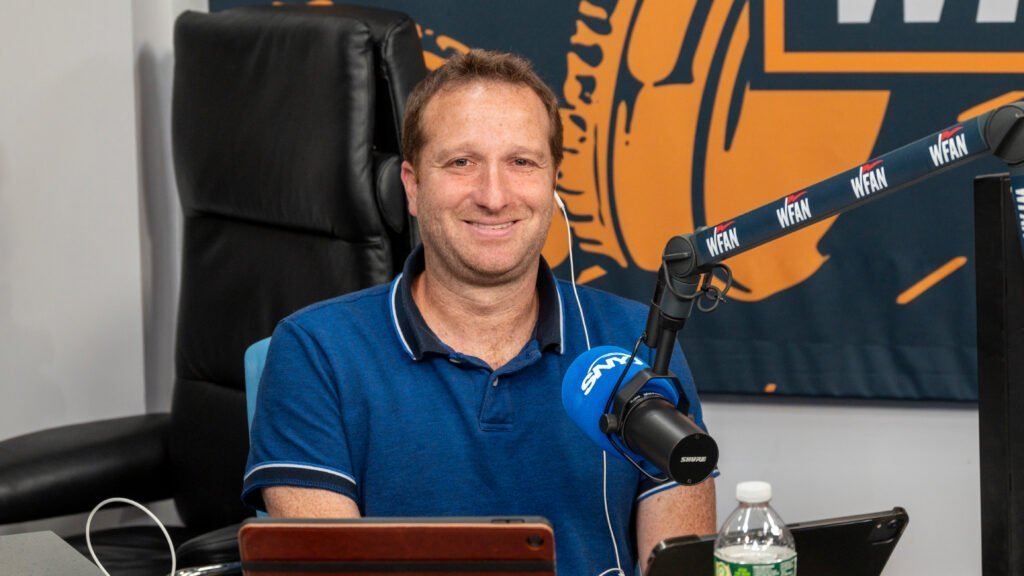
“The biggest adjustment I had – more so than even working with Tiki because I think it’s easy [since] we’re talking [and] we’re having fun – was [that] I switched seats,” Roberts said. “I went from a seat where I never saw the TV, never saw the camera [and] forgot we were on TV.
“Now, I’m going to sit where I can kind of see it in the corner of my eye, and I always try not to look because we’re not doing a TV show – we’re doing a radio show – and I think that’s what the people want.”
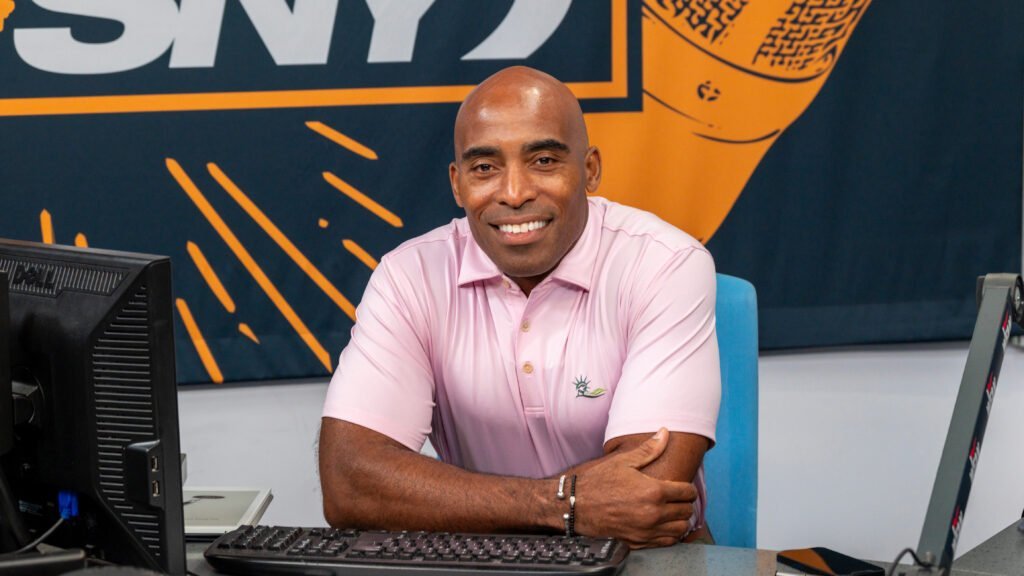
“I look at the camera,” Barber said, leading the show’s cast to erupt in laughter.
Barber, along with on-air contributor Shaun Morash and executive producer Tommy Lugauer gather in Roberts’ office before each show to review the rundown and determine the best approach. Adorned on the walls of the room, which was formerly Carton’s office, are photos of the Brooklyn Nets former “Big Three” of Kyrie Irving, James Harden and Kevin Durant, along with a blown-up X profile photo of New York Mets owner Steve Cohen. Surrounded by sports memorabilia, familiar mementos and a massage chair, the afternoon crew holds a daily pre-show meeting as the clock inches closer to 2 p.m.
“It was an opportunity that was presented to me,” Barber said of moving to afternoon drive. “I know that opportunities aren’t always perfect because I’ve been with [Brandon Tierney] for a decade-plus, but you better take them because they don’t come around often. It was a no-brainer for me.”

The Major League Baseball trade deadline dominated the local sports discussion on the day of my visit to WFAN’s studios. The Mets and Yankees were under the microscope for what they would or wouldn’t do. Before Tuesday, the most notable move of the deadline was the Mets opting to trade three-time Cy Young Award-winner Max Scherzer to the Texas Rangers.
When the trade of Mets pitcher Justin Verlander was reported, the sound of glass breaking disrupted the conversation and effectively tore the show rundown to shreds. All eyes were on Roberts, an avid Mets fan known for his impassioned reactions and shrewd intellect, to see how he would feel about an inconspicuous shift in the direction of the organization. Upon finding out that the Mets were sending the Houston Astros $54.5 million in the deal, and in turn expediting the growth of its minor league system, it became obvious what the Mets had decided to do.
“It’s exciting to get young players – there is something exciting about that – but it’s depressing,” Roberts said, seconds after details of the trade were made public. “You don’t get the immediate satisfaction.”

After about three minutes passed, Roberts signaled to the control room to cut the commercials and return live on the air. He had just discovered that the Mets were receiving the Houston Astros’ top prospect, outfielder Drew Gilbert, as a part of the deal and wanted to divulge the news to the listeners. Several minutes later after conflicting reports, it was confirmed that another prized young prospect, outfielder Ryan Clifford, was also heading to Queens, something Roberts learned and reacted to in the moment.
“You never want to be gone too long,” Roberts said. “I know we have commercials, and I respect that, but then there’s also the trade just went down; we need to get back.”
The already-strong chemistry of the brand new show was evident, looking like a well-oiled machine that had worked together for years rather than mere weeks.
“It’s hard to plan for a day like this because you simply don’t know what’s going to happen,” Barber added, “but it leads to organic reaction, which is, I think, the fun part about it.”
Even though the new afternoon show was facing its first genuine test of adapting to a fluid situation on the air, it did not phase anyone involved. Roberts and Barber are both engrossed in the New York sports scene and are adept to keenly ascertain the future implications these transactions may have. Morash and Lugauer also adequately pick their spots, providing their voices to the program and balancing it with their production responsibilities.

“I really believe that this is the first show that WFAN has had, and correct me if I’m wrong, where essentially every single fanbase is going to have a voice,” Morash said.
“….There is a voice in this room for every single fanbase, which is so unique and different, and you would think should be so common – but hasn’t been in the history of WFAN.”
Lugauer has also been involved in radio for over a decade, and is now hosting the “Bridge” program on nights where the station is not broadcasting a sporting event. When Carton returned to WFAN, it was Lugauer who was tabbed as the afternoon show’s producer. He gained extensive repetitions in overseeing a program with an effervescent, unpredictable talent.

“Working with Craig is like riding Space Mountain for the first time – you never know what’s coming next – so there’s a little bit more structure and I have a little more feel,” Lugauer expressed. “I always say [that] you can tell right away if a show has chemistry, and I knew from our first hour I was like, ‘We had that chemistry.’”
As Evan & Tiki prepared to take the air, Brandon Tierney and Sal Licata were in the final hour of their new midday show which, for now, is going by The Brandon Tierney and Sal Licata Show. The title, Tierney feels, is especially long-winded for a radio program and will, at some point, likely be shortened to BT & Sal.
“I get it [with] name recognition and I understand why we’re doing this from a management point of view,” Tierney said. “When you think BT & Sal, to me those are guys you want to hang out with.”
The volume of the midday show may, perhaps, be the greatest on the station and is a deviation from the sound of Tierney’s old program with Barber. Both hosts bring a joy and passion for more than New York sports to the air every weekday, cognizant of the honor it is to be featured hosts on a broadcast outlet with the cache and reputation of WFAN.
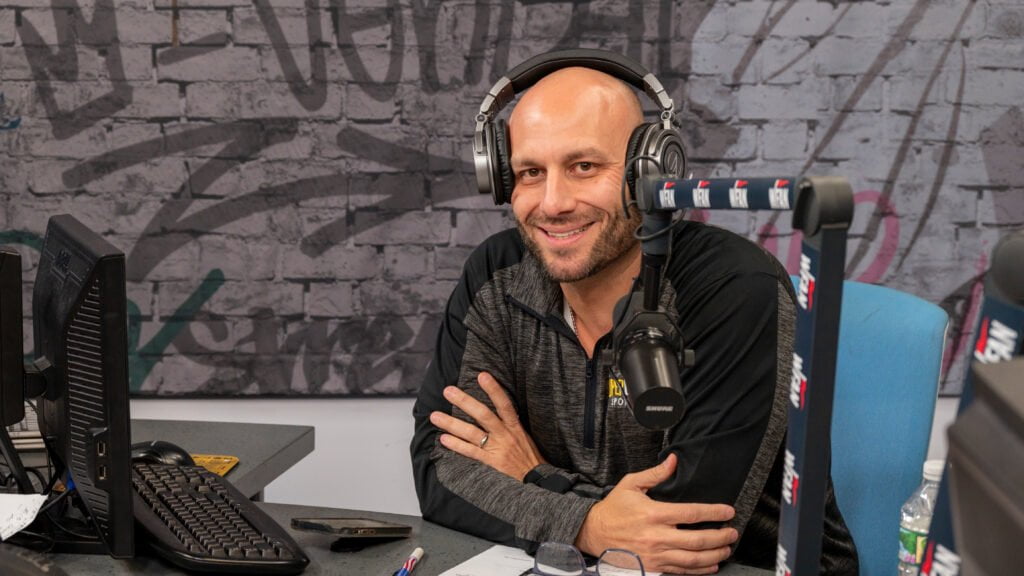
“Any spot on the FAN, to me, is a dream; to have your own show, but to be on in the middays in particular during the day – honestly, I can’t even describe it,” Licata said. “It’s something that I’ve always dreamt of, but I can’t even believe it’s actually become a reality.”
Licata enters middays after a stint hosting overnights on the station, a role he balanced with his on-air obligations at SNY. He could be seen regularly on Baseball Night in New York and frequently made contributions on Honda SportsNite. From there, he would traverse to WFAN and return home to go to bed between 5:30 or 6 a.m. Today, those hours are when he wakes up. Now his workday starts with radio and concludes with television.
“I’m still doing SNY, but most nights I’m home with my wife and I get to see my daughter before she goes to sleep,” Licata said. “It’s totally different – opposite hours – but I love it so far.”
Neither host is focused on individual accolades, instead collaborating and ensuring that the show finishes at the top of the ratings and has a legacy as the No. 1 program in the history of New York sports radio. While many people would say these goals are lofty, Tierney and Licata believe they have the rapport and the chemistry to realize their desired sublimity.
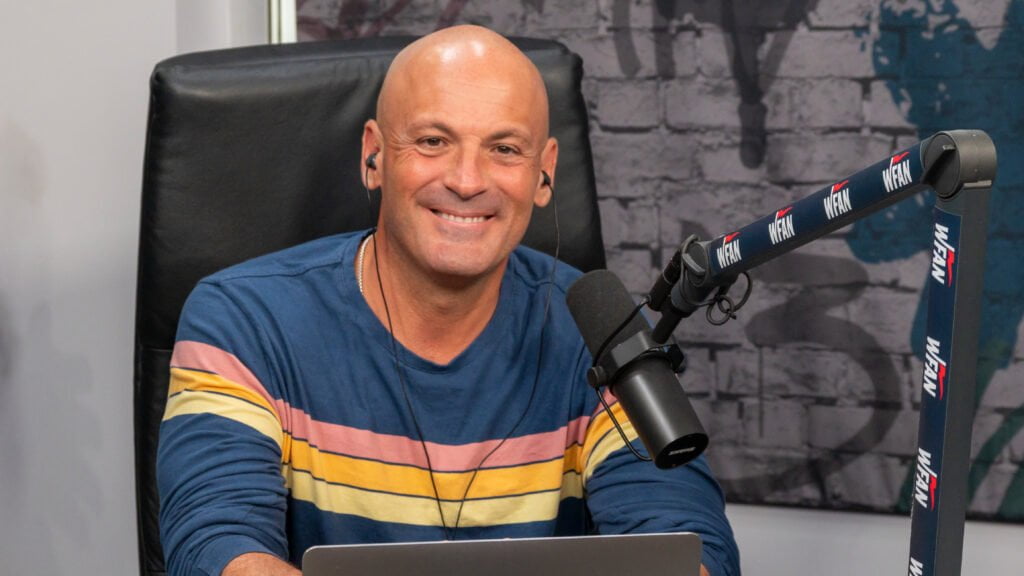
“I offer no concessions and I put no boundaries and parameters on what we can be,” Tierney said. “I want people to, when they talk about us – when they talk about me and Sal and our union and our dynamic – I want them to say, ‘That is the show that I can’t miss. That is the show that I need to listen to.’”
While Tierney and Licata were not the ones on the air when Verlander was dealt from the Mets back to the Astros, there was plenty of conversation of rumblings beforehand – and a surfeit of people looking to chime in. Staffers were screening various audience members looking to make their voices heard about the topics at hand. In fact, the phones were illuminating behind the glass as the duo interacted with both first-time and frequent callers.
“Even if we do yell at them or disagree, I would treat them the same way that I would want to be treated as a caller too,” Licata said. “We talk about sports, no different.”
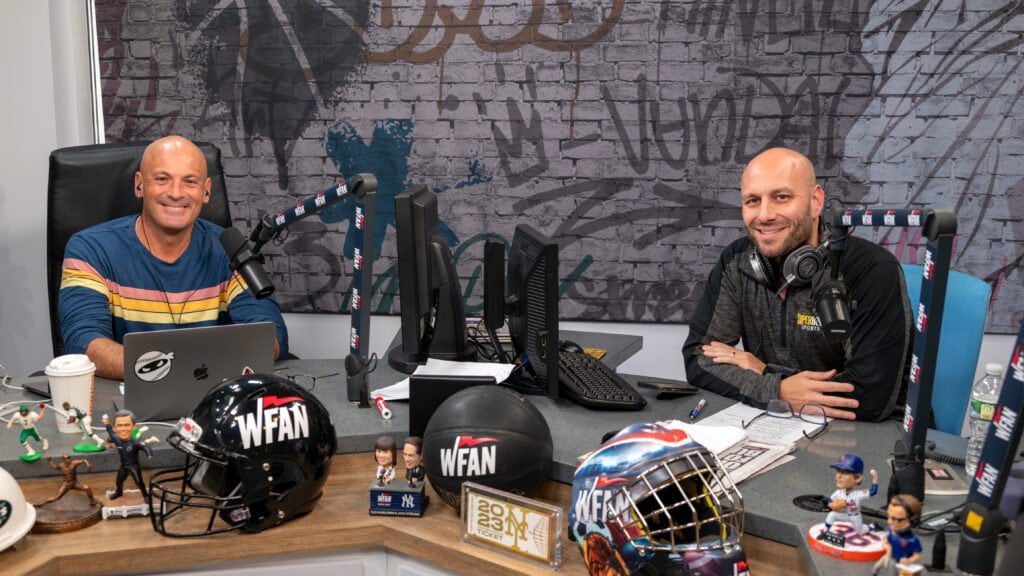
The first episode of the midday show commenced with a roaring start despite the shortcomings of the local baseball teams, and the on-air chemistry of the duo was immediately palpable. Tierney and Licata trust one another and share the same goal of ascending the summit and setting the bar higher each day. They never take time on the air for granted or eschew the truth, even if it means they need to refine a previous opinion.
“I think Sal is that way where he’s not afraid to be wrong,” Tierney said. “It took me a while to learn, ‘Don’t be afraid to be wrong.’ What you say on Monday could change on Thursday – that’s the way of the world; it’s evolving, certainly as it pertains to sports.”
While the lineup has received positive feedback from listeners and management, having an established morning program before new midday and afternoon shows alleviates some of the pressure to immediately succeed. Boomer Esiason and Gregg Giannotti provide a sense of stability at the start of the day and continue to dominate in the ratings books, a combination the station expects to permeate among the other programming.
“If people build habits and they continue those habits, it leads to success,” Oliviero said. “Having that known quantity with Boomer & Gio to start the day is an advantage.”
“From a leadership standpoint, it’s an opportunity for them as the big show; the successful show to help elevate everyone else, which they’ve done a good job of, and help shine a light on our new shows,” Eskin added. “They’ve been great – Boomer; Gio; Al; Jerry; Eddie have [all] been awesome.”
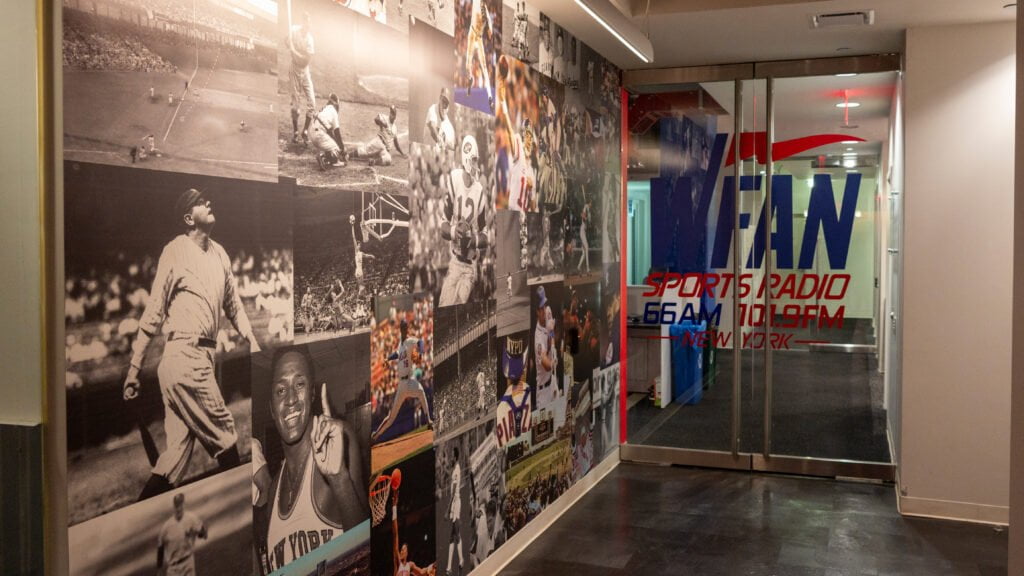
WFAN first launched in 1987 under the leadership of Emmis Communications founder and chief executive officer Jeff Smulyan. There are odes to the past throughout the outlet’s broadcast facility in lower Manhattan – including the notorious afternoon program Mike and the Mad Dog – and everyone in the building recognizes how fortunate they are to be working at such a venerated outlet. The station was previously located in the sub-basement of the Kaufman Astoria Studios before moving to the Hudson Square neighborhood in late 2009. Its location is a prime destination within a sprawling metropolis featuring fans of nearly every sports team.
When Eskin walked in for the first time, he tried not to think about the magnitude of the outlet. Growing up, he knew of WFAN but did not have much of an impression of it, instead remaining focused on sports in the Philadelphia area. As he opened the glass doors to enter the station for the first time in July of 2021, Eskin was implicitly marking the start of a new era of WFAN. Two years later, marking the start of a new era at WFAN is becoming a habit for him.
As Oliviero and Eskin oversee the revamped programming lineup, they are judging success based on a litany of quantitative and qualitative key performance indicators. They span beyond traditional measurements radio stations look at, including listenership, advertising volume and overall reach. Instead, these objectives are amalgamated with other factors and are all within a greater barometer of success.
“You’ve probably heard the two ‘Rs’ – it’s ratings and revenue – I try to add a third ‘R,’ which is ‘relevancy,’” Oliviero said. “For me, FAN’s success is those three ‘Rs’… and I would challenge anyone to name a sports media platform in market No. 1 in New York City that is more relevant than FAN. You won’t find one.”
“As long as we are proud of what is coming out of the speakers and we said that we worked as hard as we could and as smart as we could to make it good, then that’s all that matters to me,” Eskin added. “I am proud of that regardless of the result otherwise.”
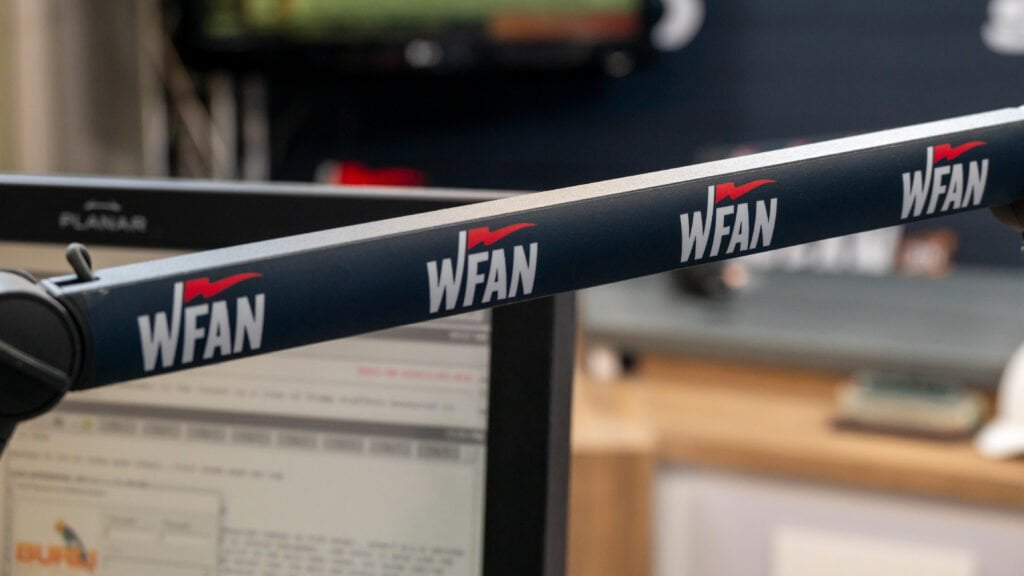
While Eskin is positioning the station for sustained success, he vows not to lose sight of the station’s storied past. From Pete Franklin to Mike Francesa and Christopher “Mad Dog” Russo; Suzyn Waldman to Ed Coleman; Don Imus to Steve Somers and many more, the call letters carry weight.
“WFAN has had a very successful 35 years, and my goal is to set it up for the next 35,” Eskin said. “I likely won’t be here as long as Mark [Chernoff] was – I’ve never seen anybody put in more hours than Chernoff…. The goal is to respect our heritage [and] respect what the radio station means to people, but evolve it in a way that makes it successful moving forward.”
Derek Futterman is an associate editor and sports media reporter for Barrett Media. Additionally, he has worked in a broad array of roles in multimedia production – including on live game broadcasts and audiovisual platforms – and in digital content development and management. He previously interned for Paramount within Showtime Networks, wrote for the Long Island Herald and served as lead sports producer at NY2C. To get in touch, email Derek@BarrettMedia.com or find him on X @derekfutterman.




